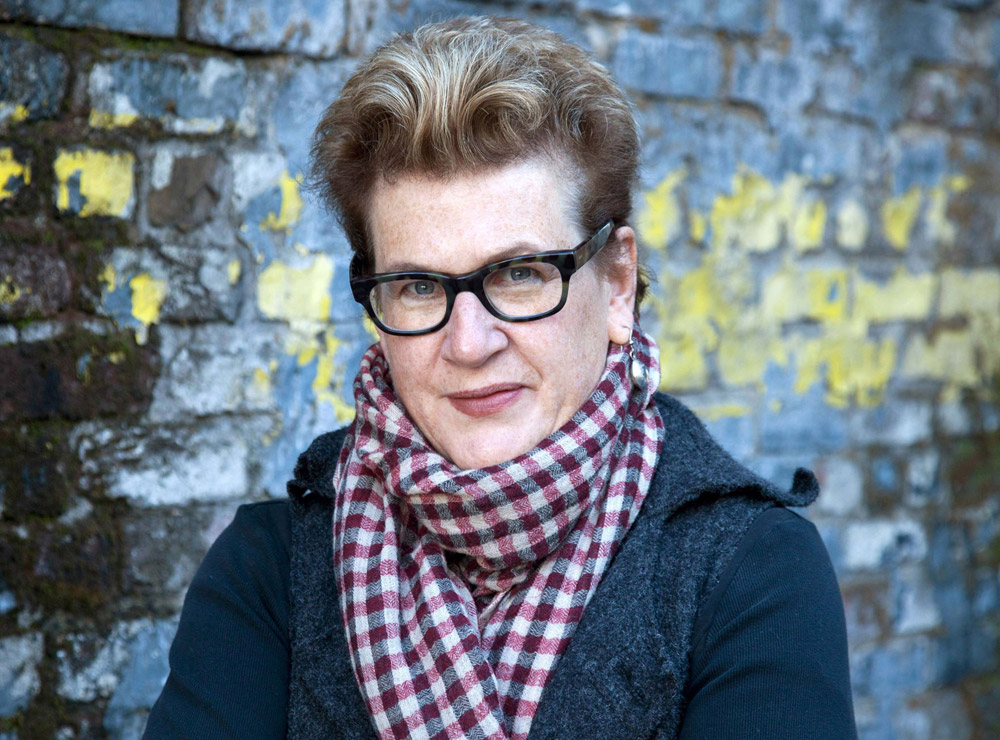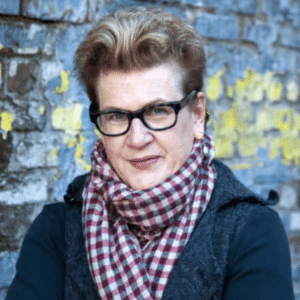
Explore Meg Rosoff’s provocation for the ‘Fuelling Creative Minds’ National Conversation event at the Bath Literature Festival on March 2, 2016.
This speech forms part of the International Literature Exchange, a partnership between the British Council and the National Centre for Writing that brings literature professionals together to learn, exchange expertise and experience, devise collaborations, and build international networks.


LET’S BEGIN WITH YOUR FUNERAL
Let’s talk about what makes a ‘successful’ life.
Did anyone love you? Did you contribute to someone else’s happiness? Did you help someone in trouble? Did you love someone over a long period of time, even when it was difficult to sustain that love? Did you question injustice? Did you give away some of your money – no matter how little of it there was – to someone who needed it more than you did? Did you have a passion? Did you think about your time on earth? Did you ease suffering, enlighten someone’s mind, do a job with honesty and integrity? Did you appreciate nature, stand up for what was joyous and what was morally right? One of my few really interesting professors at Harvard was a psychiatrist called George Vaillant, who took over a seventy-five year assessment (begun in the early 1940s) of a group of Harvard undergraduates. The Grant Study was set up to trace the sources of and influences on success (or lack of success) in every arena of life.
The subjects still alive are now in their nineties and still being studied.
By means of questionnaires and interviews, 268 men were followed closely, year after year, looking for correlations between geography, IQ, family life, emotional intelligence, diet, marital status … and success.
Here are a few of the things they found.
- Above a certain basic level of intelligence, more is not necessarily better
- Career success depended on warmth of relationships and, above a certain base level, not on intelligence
- Men who had ‘warm’ childhood relationships with their mothers earned more than men whose mothers were uncaring
- Men who had poor childhood relationships with their mothers were much more likely to develop dementia when old
Vaillant’s key takeaway, in his own words: ‘The seventy-five years and twenty million dollars expended on the Grant Study points … to a straightforward five-word conclusion: “Happiness is love. Full stop.”?’
So (despite many of the Grant Study’s results being presented in terms of income) in the end, it seems, happiness comes down to the quality of your relationships – friendships, sexual relationships, family relationships, working relationships, relationships between parents and children. If you live a happy and fulfilled life, then you die successful.
So why do we persist in measuring success in terms of salaries, job titles and assets? Why do we measure the success of executives by the size of their bonuses? Doctors and lawyers by their hundred hour weeks? Writers by how many books they sell? Children by their number of A*s? Why do we (currently) determine success based on media exposure, fame, number of Twitter followers? Why are we endlessly trying to quantify life experiences, as if the person with the greatest number of followers on Facebook, the biggest bank balance or the greatest number of A*s somehow wins?
According to George Vaillant, none of these things contributes markedly to happiness.
Perhaps we need to go back to the very beginning – to the very definition of success, and to how we educate our children to think about success, in order to get to the bottom of our thinking on the subject.
So let’s go back to school.
In the twenty-first century, educational success is largely determined by the government. The government puts in place a series of goals that evaluate children as young as three against measures of socialisation, reading proficiency, an understanding of numbers, the ability to answer questions in an acceptable, established manner, and later – during GCSEs and A levels – the ability to pass exams in up to twelve subjects and write essays in a strictly approved fashion.
Success in school requires hard work and a competitive approach to study on the part of students – but more to the point, a successful student is one capable of achieving goals as defined by the exam graders, as defined by the government.
A successful student is one capable of matching learning to this very specific series of goals.
In other words, a child who reads all day is not a successful student. A child who writes brilliantly and with a distinctive voice but can’t spell, is a failure. A child who loves history but can’t write an essay in the approved manner, is doomed. A child who loves stories, who loves to dream, who makes unusual connections, whose brain works in unconventional, peculiar ways – but who can’t multiply 11 x12 – is not a successful student.
Successful students must sit still and concentrate for long periods of time, temporarily memorise large amounts of information, understand and achieve received goals, think inside the box. A desire to please and a willingness to conform are key.
The least successful children in this sausage factory will be branded from the age of five. Children with parents or carers who don’t talk or read to them enough are most likely to fall into this category of early failures. As are dyslexic children. Or eccentric thinkers. An irregular schedule, disorderly home life and financial instability all interfere with the attainment of ‘success’ as determined by the government.
Less support at home, fewer books, a less regular schedule, a less orderly home life, less healthy meals, less consistent love – all these economic or emotional disadvantages further condemn the five year old to failure. Food banks, immigration problems, substance abuse problems, unemployment, parental absence or mental illness – all of these elements interfere with the attainment of ‘success’ as determined by the government.
I see them when I visit secondary schools – the children branded failures because they can’t get on in school. Because they’re bored, or not very verbal, or not very good at sitting still and taking information in as required in a classroom situation – or the ones who just don’t see why thirteen years of their lives should be spent taking exams they’re not good at, absorbing information in a manner that hasn’t changed much in two hundred years. ‘Not a student’ is a label that has condemned decades of children to a diminished sense of what they’re capable of in life. When in fact all it means is, ‘does not thrive within government parameters’.
Do I buy into the idea that these students are without value? Of course not. Put them in a different sort of learning environment or teach them something that stimulates their imaginations and they’ll be fine. But sit them in a classroom for thirteen years with a series of targets chosen by a government that knows nothing at all about education and they’re doomed.
In contrast, the most successful children in this whole process of learning and taking exams will get all A*s and go to Oxford or Cambridge, after which they will go on to have what most people consider to be the most successful lives – the best jobs, the highest salaries, large and comfortable and expensive houses and cars.
And yet.
In a 2014 book, Excellent Sheep: The Miseducation of the American Elite and the Way to a Meaningful Life, award winning American essayist and educator William Deresiewicz concerned himself with what’s going at the top level of American education:
‘Our system of elite education manufactures young people who are smart and talented and driven, yes, but also anxious, timid, and lost, with little intellectual curiosity and a stunted sense of purpose … great at what they’re doing but with no idea why they’re doing it.’
This was written about Harvard and Yale but applies just as well to elite British universities. Like the highest rated state primary and secondary schools, these institutions take few risks – they admit top performing, highly driven teenagers and turn out graduates with no motive to question the status quo, no motive to question the structure of society or the weight that society puts on a certain kind of success.
If you win a beauty contest, you don’t dedicate your life to challenging society’s perceptions of beauty.
William Deresiewicz continues:
‘So extreme are the admission standards now that kids who manage to get into elite colleges have, by definition, never experienced anything but success. The prospect of not being successful terrifies them, disorients them. The cost of falling short, even temporarily, becomes not merely practical, but existential. The result is a violent aversion to risk.’
It is difficult to think of a single aspect of life on earth today that couldn’t do with rigorous deconstruction and rethinking.
All of this is happening at exactly the moment at which the world most needs risk takers: individuals willing and able to retell the story of society in a more positive way. People willing to take risks with meaningful social and political change. Hardly anyone would disagree that our political system needs changing – free market capitalism has led to terrifying extremes of wealth and poverty. The pharmaceutical industry needs meaningful change along with the system of drug patents that price simple, inexpensive drugs out of the reach of entire populations whose lives they might save. The legal system favours those with money, as does education, as does housing. In the meantime, there is little financial motive to stem – or even acknowledge – the devastating effects of global warming. It is difficult to think of a single aspect of life on earth today that couldn’t do with rigorous deconstruction and rethinking.
If schools are going to train a better class of political leaders, entrepreneurs, scientists, parents, and social policy-makers, they’re going to have to ask themselves which qualities to promote. If we require a more compassionate, more radical, less class-riven and self-centred definition of success, where does it begin?
I would like success to be redefined. I would like a successful man or woman to be defined as one who thinks creatively and laterally, who questions authority and accepted wisdom, who lives thoughtfully, generously and not entirely for personal gain. To be successful, I believe, it is important to leave the world a little bit better than you found it.
How do we do this? By listening to the wise and enduring voices of our civilization – by encouraging each new generation to read history and philosophy and to think big thoughts – about religion, politics, ethics, love, passion, life and death and the origins of the universe. The extraordinary imagination of our species – as expressed in poetry and fiction, music, art, dance – might someday spill over into cures for cancer and war and inequality. This will happen not by thinking about what we are, but what we might be.
A further striving after knowledge and meaning is the proper goal for education. Everyone doesn’t need to achieve A*s. But everyone needs to learn how to live a good, creative, questioning life.
What we don’t need are more five-year-old failures and more excellent sheep.
ABOUT MEG
 Meg Rosoff is an American writer based in London, United Kingdom. She is best known for the novel How I Live Now, which won the Guardian Prize, Printz Award, and Branford Boase Award and made the Whitbread Awards shortlist.
Meg Rosoff is an American writer based in London, United Kingdom. She is best known for the novel How I Live Now, which won the Guardian Prize, Printz Award, and Branford Boase Award and made the Whitbread Awards shortlist.



